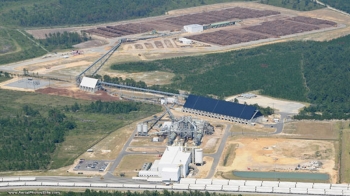Guest blog post by Acting Assistant Secretary of Commerce for Economic Development Matt Erskine
As they search for opportunities to grow their economies and create jobs, no region in the United States can really choose to ignore the global marketplace—in fact, it just makes common sense. The latest export numbers bear this out: Since 2009, record-breaking levels of U.S. exports have supported an additional 1.2 million American jobs. And in March, the latest figures show that U.S. exports increased 2.9 percent, the largest increase since July 2011.
The benefits of increased engagement with world markets is something that the city of Waycross, Georgia, has experienced firsthand. In 2010, local authorities successfully concluded negotiations with a German energy firm, RWE Innogy, to build a new $135 million wood pellet manufacturing plant in the Waycross–Ware County Industrial Park. The pellets, which are produced from locally-sourced wood, are used as a cleaner-burning substitute for coal in the generation of electricity. A challenge was making sure that these pellets could be shipped quickly and cost effectively to major transportation hubs. A $1.3 million grant from the Economic Development Administration (EDA) resolved this by funding the construction of a new rail spur, ensuring that the pellets could be shipped to the port of Savannah and from there to overseas buyers.In May 2011, the Georgia Biomass plant went online, and today, after a year in operation, the company has 80 employees producing about 750,000 tons of wood pellets annually that are shipped to buyers in northern Europe. The new plant has also spurred the creation of new jobs at local timber firms, due to the increased demand for their raw materials. This spill-over effect shows how important exports can be to the health of a regional economy, spurring increased sales and job creation in related sectors.
With 95 percent of the world’s consumers living outside our borders, regions that act to engage with the world market will find a path to economic health and job growth. This week, President Obama issued a proclamation to proclaim May 21–25 as World Trade Week, which is being commemorated by a series of state and local events across the country to promote U.S. trade relationships and provide resources to U.S. businesses looking to export their goods and services around the world. The Commerce Department is partnering with public and private-sector organizations to connect American companies of all sizes with opportunities abroad, helping to implement three landmark trade agreements with Colombia, Korea, and Panama, and is aggressively working toward meeting President Obama’s National Export Initiative (NEI) goal of doubling U.S. exports by the end of 2014, which will support millions of good-paying U.S. jobs.
The experience of Waycross shows that when a variety of pieces come together—including regional coordination, a ready transportation infrastructure, and foreign direct investment—that the president’s goal is attainable.



Comments Closed
Due to increased spam, comments have been closed on this content. If you wish to comment about the content, we encourage you to email webmaster@doc.gov.